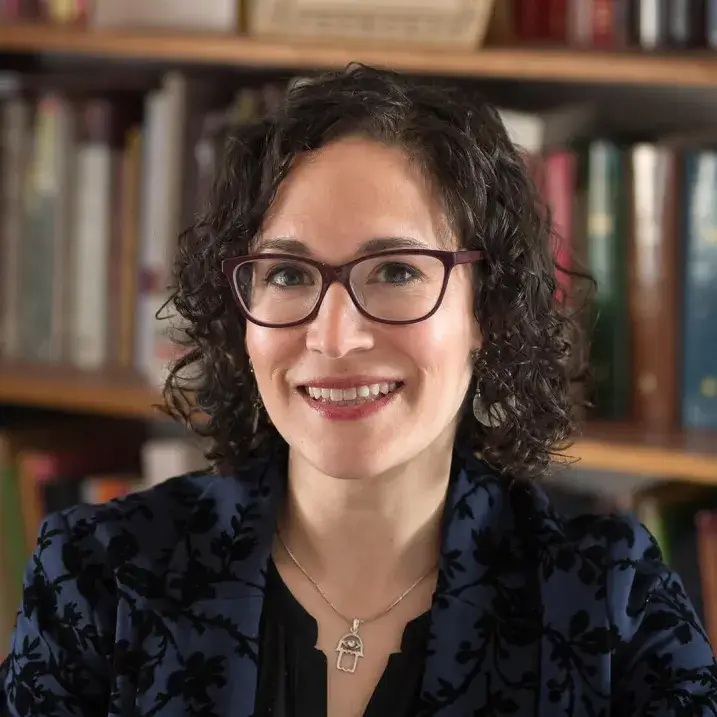- Ph.D., University of North Carolina at Chapel Hill
- M.T.S., Harvard Divinity School
- B.A., Colgate University
JOURNALISTS: Need help scheduling an interview? Contact UVM media relations or search for a UVM expert.
Areas of expertise
Religions in South Asia, history of religion, Islam and race, religion, and empire, and antisemitism and islamophobia.
BIO
Professor Morgenstein Fuerst specializes in Islamic studies. Her areas of expertise include Islam, religions of South Asia, and theories and histories of religion. Morgenstein Fuerst's research deals has addressed a range of issues, including racializations of religion, historiography, definitions of “religion,” Indo-Persian manuscripts, and colonialism and imperialism. She earned her B.A. in Religion from Colgate University in 2005, an M.T.S. at Harvard Divinity School in 2007, and a Ph.D. from the University of North Carolina at Chapel Hill in the Islamic Studies concentration in the department of Religious Studies in 2012. At UVM, she has taught courses on Islam, South Asian religions, theory and method in the study of religion, modernity, race, and empire.
“My work centers on definitions: what is religion? How is it used? Who uses it—and when? To what avail? How is religion present and absent, cultivated and deployed across geographic location and historical eras? There are seemingly infinite answers to this complex questions. But my work in and outside the classroom seeks to think these through. Specifically, my research deals with how Muslims and other South Asians used the category of religion—and ones like it—to order political, social, and private aspects of their lives in the modern period and beyond. Understanding these complicated, historically rooted conversations is important if we are to attempt to understand how religion continues to shape South Asia—and the way we study it—today. In both my research and my teaching, I aim to bring historical contexts, conceptions, and debates to the fore; I want my students to wrestle with the legacies such an untidy history and topic undoubtedly leaves upon their world.”
Courses
REL 1230 - D2: Introducing Islam Introduces Islam in the context of the study of religion, focusing especially on its variation over time and location, as evidenced by texts, rituals, festivals, and competing interpretations. Credits: 3.0
REL 2050 - Interpretation of Religion Examination of major theories and methods used in studying and interpreting religious phenomena. Credits: 3.0
REL 1050 Religion, Politics and Power Introduction to major themes in the study of religion, tracing their development over time. Special
emphasis is placed on material effects of the category of religion, including case law, current events, analysis of social constructs
(gender, race, sexuality, time), and engagement with key theoretical texts in the study of religion. Credits 3.0
REL 2238. Islam and Race
Islam is not a race (religions are not races) but Islam and religions are racialized. Examines how Islam and Muslims come to be seen as a race and the effects thereof in the North American context.
Publications
Bio
Professor Morgenstein Fuerst specializes in Islamic studies. Her areas of expertise include Islam, religions of South Asia, and theories and histories of religion. Morgenstein Fuerst's research deals has addressed a range of issues, including racializations of religion, historiography, definitions of “religion,” Indo-Persian manuscripts, and colonialism and imperialism. She earned her B.A. in Religion from Colgate University in 2005, an M.T.S. at Harvard Divinity School in 2007, and a Ph.D. from the University of North Carolina at Chapel Hill in the Islamic Studies concentration in the department of Religious Studies in 2012. At UVM, she has taught courses on Islam, South Asian religions, theory and method in the study of religion, modernity, race, and empire.
“My work centers on definitions: what is religion? How is it used? Who uses it—and when? To what avail? How is religion present and absent, cultivated and deployed across geographic location and historical eras? There are seemingly infinite answers to this complex questions. But my work in and outside the classroom seeks to think these through. Specifically, my research deals with how Muslims and other South Asians used the category of religion—and ones like it—to order political, social, and private aspects of their lives in the modern period and beyond. Understanding these complicated, historically rooted conversations is important if we are to attempt to understand how religion continues to shape South Asia—and the way we study it—today. In both my research and my teaching, I aim to bring historical contexts, conceptions, and debates to the fore; I want my students to wrestle with the legacies such an untidy history and topic undoubtedly leaves upon their world.”
Courses
REL 1230 - D2: Introducing Islam Introduces Islam in the context of the study of religion, focusing especially on its variation over time and location, as evidenced by texts, rituals, festivals, and competing interpretations. Credits: 3.0
REL 2050 - Interpretation of Religion Examination of major theories and methods used in studying and interpreting religious phenomena. Credits: 3.0
REL 1050 Religion, Politics and Power Introduction to major themes in the study of religion, tracing their development over time. Special
emphasis is placed on material effects of the category of religion, including case law, current events, analysis of social constructs
(gender, race, sexuality, time), and engagement with key theoretical texts in the study of religion. Credits 3.0
REL 2238. Islam and Race
Islam is not a race (religions are not races) but Islam and religions are racialized. Examines how Islam and Muslims come to be seen as a race and the effects thereof in the North American context.
Publications
Association and Affiliations
American Academy of Religion (co-chair, Study of Islam, term: 2018-2022)
South Asian Muslim Studies Association
South Asian Literary Association
American Association of University Professors
United Academics
